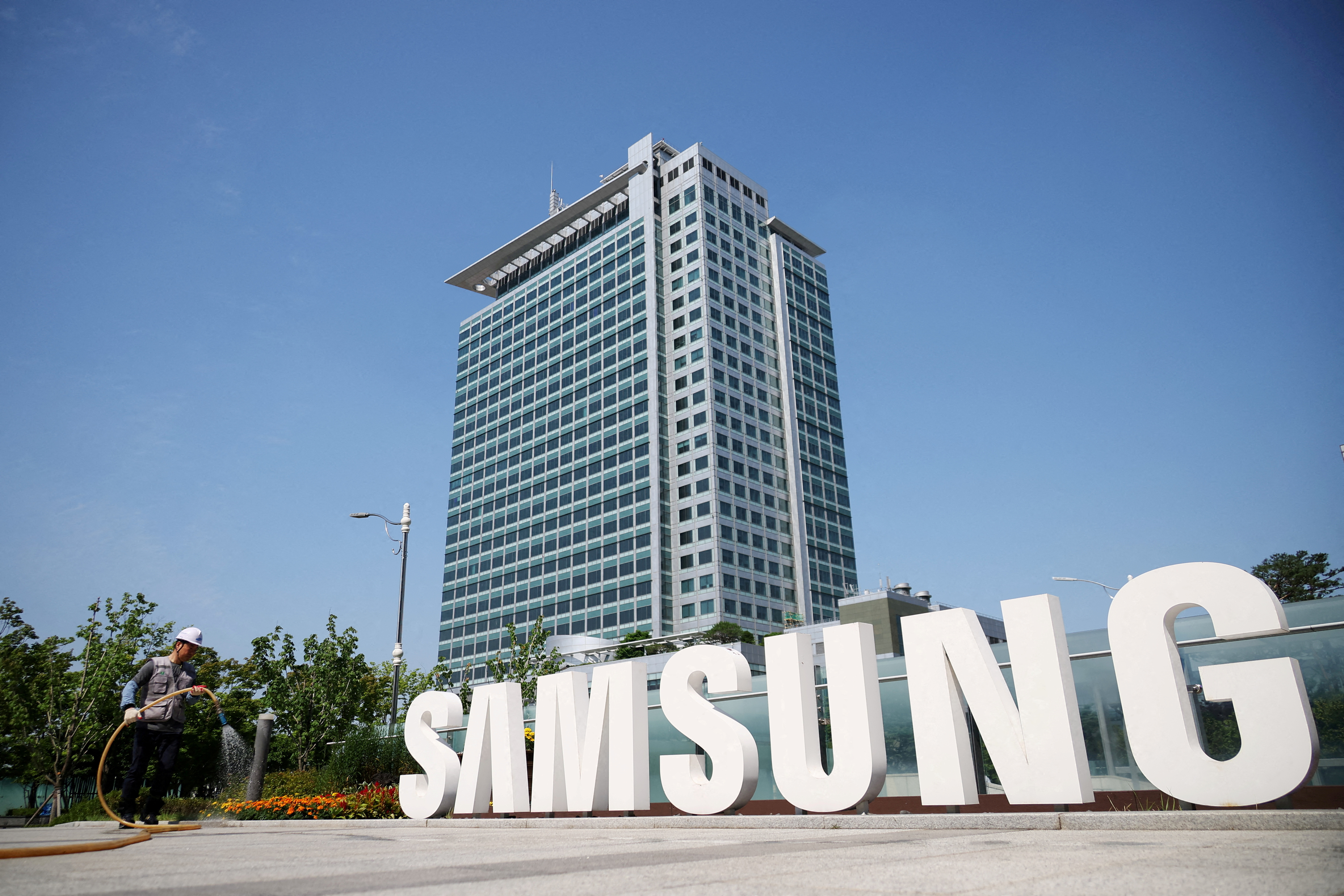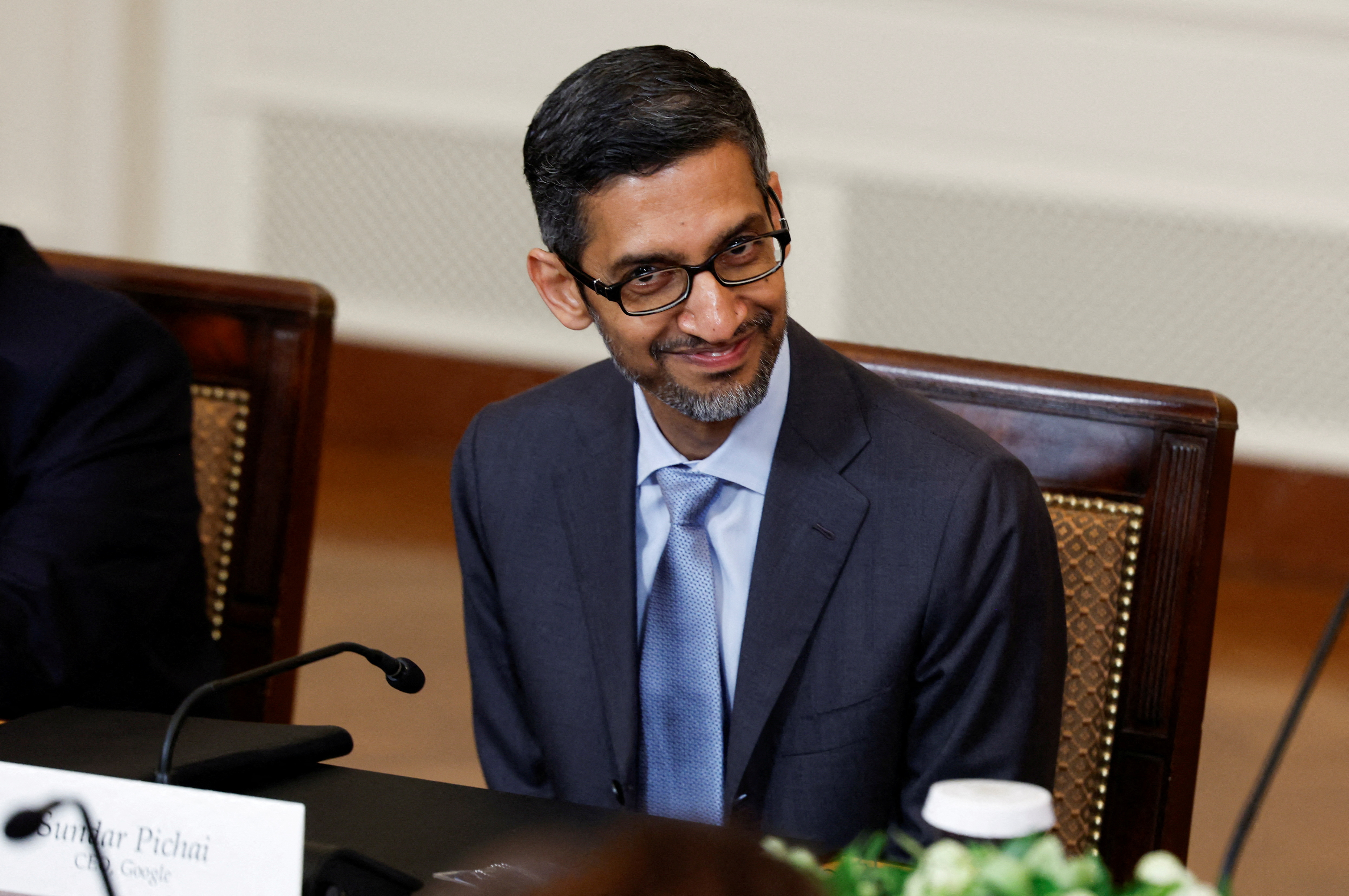(Reuters) - Apple (AAPL.O) on Monday introduced new MacBook Pro and iMac computers and three new chips to power them, with the company saying it had redesigned its graphics processing units (GPU), a key part of the chip where Nvidia (NVDA.O) dominates the market.
The new computers and the M3, M3 Pro, and M3 Max chips were unveiled at an online event heavily focused on professional users.
In the U.S., the 14-inch MacBook Pro laptop will start at $1,599 and a 16-inch version starts at $2,499. The new iMac desktop with the M3 family of chips starts at $1,299. Some will be available next week, while others will not ship until later in November.
Apple has seen a revitalization in its Mac business, roughly doubling its market share to nearly 11% since 2020 when it parted ways with Intel (INTC.O) and started using its own custom-designed chips as the brains of the machines, according to preliminary data from IDC.
As part of the focus on business users on Monday, it showed off a new secure screen-sharing feature that would let them on their machines from remote locations.
The company's custom chips, which use design technology from Arm Holdings (O9Ty.F),, have given its Macs better battery life and, for some tasks, better performance than machines using Microsoft's (MSFT.O) Windows operating system.
Unlike other laptop makers that might combine a central processor unit (CPU) from Intel with a GPU from Nvidia, Apple has combined both parts in its Apple silicon chips, which the company claims gives it better performance than its rivals.
Apple's shakeup of the market has spurred Qualcomm (QCOM.O) to redouble its efforts to make Arm-based chips for Windows, announcing plans last week to release a chip that is both faster and more energy efficient than some Apple offerings. Reuters last week reported that Nvidia also plans to jump into the PC market as early as 2025.
CORPORATE BUYING
Apple aimed the new machines squarely at designers, musicians, and software developers, at one point highlighting the way its users' memory can be used by artificial intelligence researchers, whose chatbots and other creations are often constrained by how much data can be held in the computer's memory.
Apple also tweaked its overall lineup of computers in ways that could change the behavior of corporate buyers.
While slashing the U.S. price of the new 14-inch MacBook Pro from $1,999 to $1,599, Apple appeared to have eliminated a cheaper $1,299 13-inch model of its MacBook Pro that was a big seller to businesses, said Ben Bajarin, chief executive and principal analyst at Creative Strategies.
That move will likely clarify the choice between the company's model lines, prompting choices between Apple's productivity-oriented MacBook Air models that top out at $1,299 or the new $1,599 starting price for MacBook Pro models.
At Apple, the Mac hit $40.18 billion in revenue for its fiscal 2022, or about 11% of its revenue. While that was up 14% from the previous fiscal year, sales this year have slowed along with the rest of the PC industry, which has suffered a post-pandemic slump.
Apple said the new chips would be the first for laptops and desktops that use 3-nanometer manufacturing technology, which will give the chips better performance for each watt of electricity used.
Apple did not name who is making the chips, but analysts believe it is Taiwan Semiconductor Manufacturing Co (2330. TW), which uses the same technology to make chips for the top-end iPhone 15 models.
Throughout the event, Apple executives compared the performance of the new MacBooks and iMac machines to older Apple machines with chips from Intel, playing up how much speed customers would notice by upgrading to devices with Apple's own chips.
Chinese technology giant Alibaba (9988. HK) said on Tuesday it has updated its artificial intelligence (AI) model Tongyi Qianwen and released a suite of industry-specific AI models amid an intensifying AI race among tech companies.
Alibaba's cloud computing arm at its annual conference in Hangzhou said Tongyi Qianwen 2.0 has "hundreds of billions of" parameters - a benchmark used to measure AI model power - making it one of the world's most powerful AI models by that metric.
It also said it has launched eight AI models for the entertainment, finance, healthcare, and legal industries.
The upgrade comes just six months after the model's initial release, reflecting the pace at which tech companies are racing to control China's nascent and quickly expanding AI market.
Rival Tencent (0700. HK) last month said China was in the middle of a "war of a hundred models", with over 130 flooding the market. Tencent said its Hunyuan AI has more than 100 billion parameters and exceeds OpenAI's GPT-4 model in processing Chinese.
The GPT-3 AI model from Microsoft-backed (MSFT.O) OpenAI contained 175 billion parameters in 2020 and Meta Platform's (META.O) Llama 2 model had 70 billion parameters in 2023.
Alibaba's industry-specific models went online on Tuesday, offering dedicated tools for creating images, writing computer code, analyzing financial data, and searching for legal documents.
At the conference, Chairman Joe Tsai also said about half of large-language AI models in the China now run on Alibaba Cloud.
He said Alibaba's AI model-sharing platform ModelScope now features 2,300 models and 2.7 million contributing developers.
Samsung Electronics (005930. KS) on Tuesday said it will continue to cut production to ease a chip supply glut and gear up for 2024 when it expects industry-wide investment and production to focus on high-end chips for generative artificial intelligence.
Samsung has slashed chip output this year to weather an unprecedented industry downturn, and flagged further production adjustments, especially for NAND flash memory chips, as the market starts to recover.
"We've received purchase inquiries from (server) customers seeking to secure components ... based upon widening awareness that the industry has reached the bottom," Jaejune Kim, memory business executive vice president, said on an earnings call.
"Considering the normalization of inventory levels, we expect market recovery to accelerate in PC and mobile memory."
The proliferation of on-device AI functions will increase appetite for DRAM chips such as high bandwidth memory (HBM) in 2024, the world's biggest memory chip and smartphone maker said.
Samsung competes in memory chips for AI with the likes of SK Hynix (000660. KS), which took the lead in HBM3 chips by supplying tech major Nvidia (NVDA.O). Chipmakers are now developing the next generation HBM3E for 2024.
Samsung said it plans to increase HBM output capacity by 2.5 times or more in 2024 versus this year.
Shares in Samsung were down 0.3% at midday following the comments, compared to a 1.9% decline in SK Hynix shares. The benchmark index (.KS11) was down 1.3%.
A rebound in NAND chips is less clear as those chips are for data storage and are unrelated to AI demand. Still, analysts said continued production cuts would hasten recovery in traditional memory chips.
"The most memorable part of today's call was Samsung's signal that (older) legacy chips are also rebounding... We knew things are bad for NAND, and Samsung's comment on flexible production cuts hits just the right note," said analyst Ko Yeongmin at Daol Investment & Securities.

A worker waters a flower bed next to the logo of Samsung Electronics during a media tour at Samsung Electronics' headquarters in Suwon, South Korea, June 13, 2023. REUTERS/Kim Hong-Ji/File Photo Acquire Licensing Rights
"Considering the production cut policy and the change in demand for legacy products, Q4 chip prices might rise slightly faster than anticipated."
IMPROVING DEMAND
Samsung reported operating profit of 2.4 trillion won ($1.78 billion) for July-September, 78% lower than a year prior but around a third better than the two previous quarters. Revenue fell 12% to 67.4 trillion won.
Loss in the memory chip business shrank to 3.75 trillion won in the third quarter, versus 4.36 trillion won in the second.
Reflecting improving chip demand, overall factory output in South Korea in September rose for a second consecutive month helped by increasing chip production.
In mobile devices, profit reached 3.3 trillion won, slightly higher than last year, on solid sales of premium foldable smartphones.
After contracting in 2022-2023, mobile demand is likely to stabilize next year, Samsung said. The firm targets double-digit growth in flagship mobile product shipments and revenue growth exceeding market growth.
It also said it expects to spend a record 53.7 trillion won in capital expenditure this year, including 47.5 trillion won on chips, to prepare for mid-to-long-term demand increase.
The huge figure reflects a chip industry in flux. As well as increasing focus on AI, disruption is also coming from major tech players shifting to in-house development, with smartphone rival Apple (AAPL.O) on Monday announcing a set of custom chips.
Google CEO Sundar Pichai on Monday acknowledged the importance of making its search engine the default in keeping users loyal -- a key point in a once-in-a-generation U.S. antitrust fight focused on billions of dollars Google paid to be the default on laptops and smartphones.
Google, which started paying for default status on devices in 2005, monitored for compliance. At one point, the company expressed concern to Apple (AAPL.O) that its Safari browser would send particular queries, especially lucrative ones, to companies like Amazon.com.
"We were obviously doing the deal for default placement," said Pichai.
Under cross-examination, Pichai said of Google's tens of billions in annual payments for default status: "We definitely see value."
The U.S. government brought the case over whether Google acted illegally to maintain its dominance of online search and parts of search advertising. If the government wins, the company may be forced to scrap some business practices that have helped it stay on top.
In testimony Monday morning, Pichai, who was called by Google, was shown instances when the company pressed Apple, wireless companies, and smartphone makers to make its search engine the default on their devices in exchange for revenue-sharing agreements.
"We pay for preload exclusivity on a device-by-device basis," Pichai said under questioning by the Justice Department.
A lawyer for the Justice Department asked Pichai about a 2007 discussion among Google executives including Pichai, before he became chief executive, about an Apple request to let users choose their search engine on a new version of its Safari browser.

Sundar Pichai, CEO of Google, reacts during a meeting with U.S. President Joe Biden, India's Prime Minister Narendra Modi and senior officials and CEOs of American and Indian companies in the East Room of the White House in Washington, U.S., June 23, 2023. REUTERS/Evelyn Hockstein/File Photo Acquire Licensing Rights
A document at the time said 75% of people do not change defaults and noted: "Defaults have a strong impact."
Pichai also took a couple of swipes at rival Microsoft's (MSFT.O) browser, Internet Explorer.
"The browser market at the time had kind of stagnated," Pichai said of the period before Google launched its Chrome browser, which competes with the Microsoft product.
"They (Microsoft) were not that incented to improve the browser," he added, calling Chrome a "pretty dramatic improvement" when it launched in 2008.
Google's strength in search makes it a heavy hitter in the lucrative advertising market, its biggest revenue source.
Google has argued that if people are dissatisfied with default search engines, they can and do switch to another search provider. It has also argued the revenue-share agreements are legal and it has invested heavily to keep its search and advertising businesses competitive.
In cross-examination, the Justice Department pressed Pichai about allegations that Google executives marked sensitive documents as covered by attorney-client privilege when they were not and routinely deleted instant messages without determining if they should be saved as part of litigation.
"This is not an area I was focused on," Pichai said.







